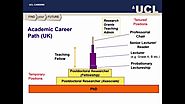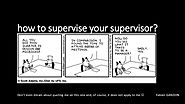-
About
- About Listly
- Community & Support
- Howto
- Chrome Extension
- Bookmarklet
- WordPress Plugin
- Listly Premium
- Privacy
- Terms
- DMCA Copyright
- © 2010-2025 Boomy Labs

 parklize
parklize
Listly by parklize
Curated articles, videos related to our research lives such as how to write research papers/thesis, how to write/respond reviews, or how to do research for PhD, Postdoc, how to prepare academic trajectory after PhD, etc. You can filter relevant topics with tags matching your interests.

There's a bit more below, but I also wrote a follow-up 5 years after the
illustrated guide which may be of interest -- HOWTO: Get tenure.

Everyone knows the rules of the “academic game” for high school,
college, and almost all types of graduate schools such as law, business,
or medical school. You “win” (get a degree) when you pass all of the
required classes. And how do you pass those classes? Turn in your
homework, study, pass exams, and maybe do a final term project. Every
school has its own fixed class requirements, and as long as you pass
those, then you get your degree.

There are two reasons why someone may want to start a PhD. On the one hand, there may be a passion for research, for developing understanding and knowledge. It may be due to a desire to be intellectually challenged and guided by a world expert in your field. On the other hand, there may be…

There are many factors involved when choosing a postdoc position- research project, lab, mentor, compensation, experience, exposure, and more.

In this post, I examine the “postdoc” as a step in a young scientist’s career. A “postdoc”, or one’s time as a Postdoctoral Associate in a lab, is traditionally the phase of a scientist’s career immediately after graduate school that precedes a career in academia. But due to sparse availability of faculty positions and plentiful PhDs produced by graduate schools every year, a career in academia is no longer a realistic option for the vast majority of new PhDs. In the face of this fact, does doing a postdoc make sense? When is it valuable for a new PhD to pursue a postdoc?

Peer review is at the heart of the scientific method. Its philosophy is based on the idea that one’s research must survive the scrutiny of experts before it is presented to the larger scientific community as worthy of serious consideration. Reviewers (also known as referees) are experts in a particular topic or field. They have…

Writing papers and giving talks are key skills for any researcher, but they aren’t easy. In this pair of presentations, I’ll describe simple guidelines that ...
When submitting an article for peer review, authors are often allowed to
submit rebuttals to reviews before the decision to accept or reject.
(Also see my advice on writing a
technical paper, and a letter to USCIS making the point that
in computer science, papers in
peer-reviewed conferences are accepted as high-quality scholarly
articles.)

Nice post, especially the point about picking some papers to champion. It's far too easy to find reasons to reject papers. As a side note, I think we should be accepting more papers in general, as I think paper-as-final-outcome---in any venue, regardless of imprimatur---is a horrible metric for impact, given the randomness of the process.I still remember a PC I was on where I reviewed a paper on BGP. In the meeting, my argument for strong accept (which echoes your comment above) was simple: I learned something. The chair was astute enough to observe that if I learned something about BGP from reading the paper, then other people very likely would, too.

Background: I am neither in academia nor publish scientific papers. However, as a research software developer, I read a lot of them.I understand your pain regarding badly written papers. These usually turn out to be the ones with unbelievable promises and results. FYI, these come to my desk to be prototyped. However, the following statement stuck out to me."Keep in mind I've got a pile of 20 or 30 other papers to review, and I'm not going to spend my time picking apart the nuances of your proofs and evaluation if you've bombed the intro."I think the bigger problem is that each reviewer gets 20 to 30 papers to review.The next question is, "If you had only 2 or 3 papers to review, would you mind spending your time picking apart the nuances of the proofs and evaluating if the author just bombed the intro?"If your answer is no; then there is nothing else that can be done. It's just an reviewer's bias where everyone has their own opinion. If the answer is yes, it indicates a deeper issues with reviewing system than with the writing.
Because on-line search databases typically contain only abstracts, it is
vital to write a complete but concise description of your work to entice
potential readers into obtaining a copy of the full paper. This article
describes how to write a good computer architecture abstract for both
conference and journal papers. Writers should follow a checklist consisting of:
motivation, problem statement, approach, results, and conclusions. Following
this checklist should increase the chance of people taking the time to obtain
and read your complete paper.

This seminar provides an overview of what a PhD involves, why you might undertake one, the possible benefits of a PhD qualification and where to find the rig...
At a seminar in the Bell Communications Research Colloquia Series, Dr.
Richard W. Hamming, a Professor at the Naval Postgraduate School in Monterey,
California and a retired Bell Labs scientist, gave a very interesting and
stimulating talk, You and Your Research' to an overflow audience of some 200 `Why do so few scientists make significant
Bellcore staff members and visitors at the Morris Research and Engineering
Center on March 7, 1986. This talk centered on Hamming's observations and
research on the question
contributions and so many are forgotten in the long run?'' From his more than
forty years of experience, thirty of which were at Bell Laboratories, he has
made a number of direct observations, asked very pointed questions of scientists
about what, how, and why they did things, studied the lives of great scientists
and great contributions, and has done introspection and studied theories of
creativity. The talk is about what he has learned in terms of the properties of
the individual scientists, their abilities, traits, working habits, attitudes,
and philosophy.

Consider these 11 factors including duration, funding, work life balance and future opportunities while comparing a PhD in Europe vs a PhD in USA
[spoiler alert:] It was a two-body problem/opportunity. But many people have asked me about it and so I thought I’d pitch in my 2 cents about academia vs. industry (which will hopefully not be too biased since really I like both and the decision is mostly independent of their merits). Of course, opinions are strictly my own.

Many graduate students applying for their first postdoctoral positions underestimate the importance of the cover letter. While it may be true that your awesomeness is beautifully outlined on your curriculum vitae, your cover letter often will dictate whether the busy principal investigator puts your application at the top of the heaping pile or into triage. First impressions are everything for some people, so leave nothing to chance. If you provide only your CV, you aren’t being very personable, and you lose a precious opportunity to highlight some things that make you stand out. On the other hand, a cover letter is also an opportunity to shoot yourself in the foot, so here are a few do’s and don’ts.

a tentative humoristic set of advice to Ph.D. students (and their supervisors)

Tips for how to find right institution & advisor for your research
